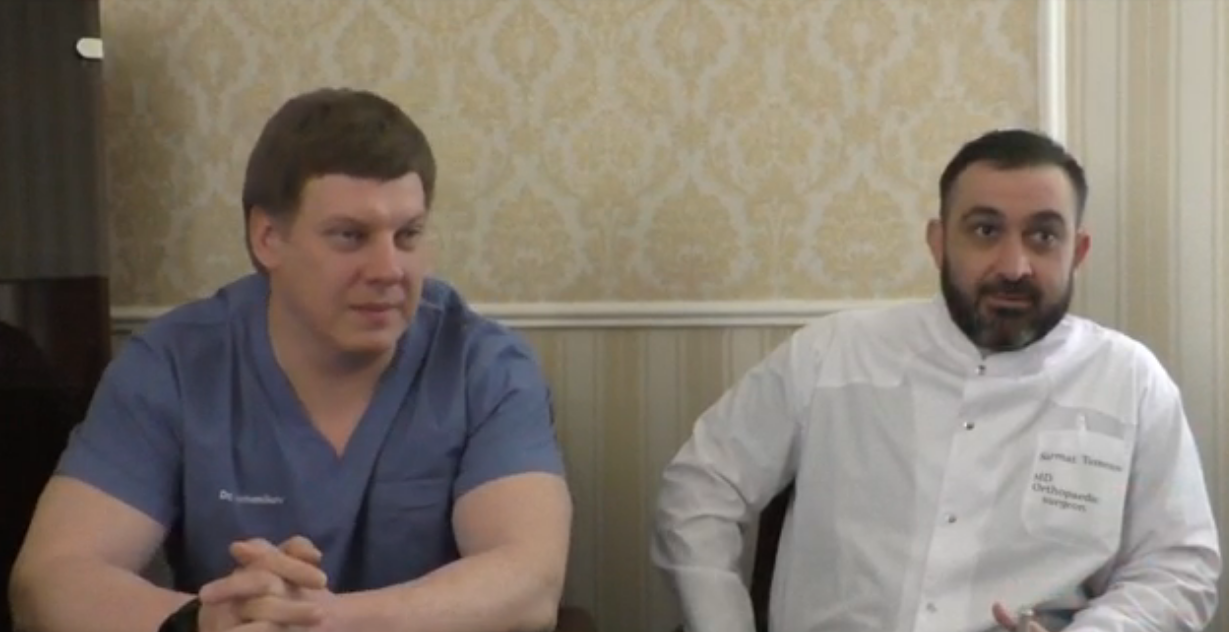Two weeks ago, an anesthesiologist-resuscitator Ilya Denisov and two of his colleagues arrived in the DPR from Moscow to volunteer to help the victims here.
With them, Russian doctors brought medicines, including antibiotics, and materials that are quickly used up during emergency care: endotracheal tubes for artificial lung ventilation, catheters, consumables for ventilators, dressings and suture materials.
“When we decided to go to Donetsk, we started calling doctors we knew, offering to raise funds for medicines for victims in the DPR.
As a result, only about 200 kg of consumables were brought - not a single health worker to whom we turned remained on the sidelines, ”says RT Denisov.
"Extra hands won't hurt"
Orthopedic traumatologists Boris Sychenikov and Sarmat Temesov have been working in the DPR since March.
“People who are here need our help.
We have been friends with doctors from Donetsk for more than a year - in general, the Donetsk medical school has been known since Soviet times.
We contacted our friends, found out that extra hands would not interfere, and off we went,” says Sychenikov.
Orthopedic traumatologists Boris Sychenikov (left) and Sarmat Temesov
© Frame: RT video
According to him, at first he and Sarmat planned to work in the DPR for ten days, but they were delayed for three weeks.
Then they went home, took a vacation at their own expense and now, as Boris jokes, they will work until “the money runs out”.
“First, we came to the city to assess the state of hospitals, to understand whether it is possible to perform operations there and treat people.
In one of the medical centers, the surgical room has been preserved, only there it is necessary to resolve the issue with the light, ”explains Sarmat Temesov.
On the next trip, doctors brought medicines to Mariupol, which they bought at their own expense: medicines for diabetes, antibiotics, hormonal drugs.
“There are local doctors in Mariupol, but there are also a lot of people who need help.
During the day, we provided first aid to almost 50 victims.
Someone can be helped on the spot, for example, to make dressings.
And someone needs to be taken out of the city in order to have an x-ray or be sent for an operation,” says a volunteer from Russia.
"Arrived with serious injuries"
Andrey Boryak, Acting Director of the Republican Trauma Center of the DPR, says that in the past two months it has happened that 20-30 wounded were brought to the hospital per day.
At first, according to him, the military was mainly brought to them, and then civilians from Mariupol began to arrive.
“People with very serious injuries came from Mariupol: untreated wounds, incorrectly fixed fractures and dislocations.
This all complicates the treatment, ”says Boryak.
Doctors often had to hold consultations, including in an online format with Russian colleagues, to decide whether a patient needed limb amputation.
All the children who were admitted to the Donetsk trauma center from Mariupol were able to save their legs and arms.
Although there were a lot of difficult cases.
“For example, a boy under ten years old came to us late in the evening a month ago.
The most severe wound of the thigh - shrapnel, chronic.
There were all indications for amputation.
Our pediatric orthopedic traumatologists decided to try to save the leg.
An operation was performed, an external fixation device was applied to fix the bone.
Then they performed a skin transplant on the child.
We fight for the slightest chance to save a limb.
Unfortunately, this did not happen with all adult patients, ”Boryak said.
The little patient was discharged from the hospital on April 23, before Easter.
Now he is undergoing rehabilitation in Russia.
According to Boriak, there are more than 440 patients in the Republican Traumatology Center, officially designed for 380 beds.
"Don't cry son"
Ukrainian prisoners of war are also treated here.
Alkhas Dzhinzholiya, a surgeon and former member of the Abkhazian parliament, says that he was struck by the way local workers treat all patients without exception.
“On the first day of my work here, a young Ukrainian kid, a prisoner of war, was brought to the hospital.
You should have seen how the nurses looked after him: stroked his head with the words "Don't cry, son."
Against the backdrop of the horror that has been happening here for many years, people have not lost their human face.
Local doctors and nurses do not have anger, and this says a lot, ”says Jinjolia.
Traumatologist, ex-Minister of Health of Abkhazia Andzor Goov (left) and surgeon, ex-deputy of the Parliament of Abkhazia Alkhas Jinjolia
© Frame: RT video
Together with him, his colleague, a traumatologist, ex-minister of health of the republic, Andzor Goov, also came from Abkhazia as a volunteer.
He already has experience in the military conflict zone.
In 1992, during the first days of the Georgian-Abkhaz war, Goov came to Abkhazia from the North Caucasus to work as a surgeon in a military hospital.
“We decided to help the people that we recognized (on February 25, Abkhazia recognized the independence of the DPR and LPR. -
RT
) and who are having a hard time today.
We arrived on April 16 and will stay as long as necessary,” says Goov.
Ginjolia agrees with him.
According to him, other volunteers are also ready to come from Abkhazia to the DPR.
“Everyone there is very worried about the situation in Donbass.
We are well aware that here they are fighting not only for the Donbass, but also, in particular, for the Abkhazian independence.
This is all one war,” says the doctor.
As for the help of volunteer doctors, he is sure that the DPR will need it for a long time to come.
“Any military action has serious consequences.
Huge areas of mining remain in the Donbass, where there are probably unexploded shells.
Unfortunately, this always happens: these shells are then found by peasants, children and passers-by and suffer from accidental explosions, ”says Ginjolia.

